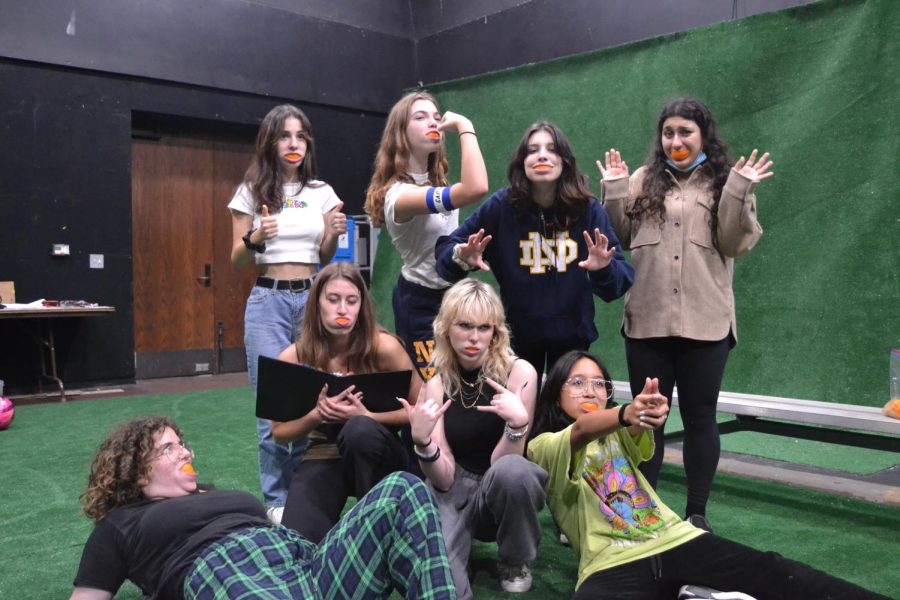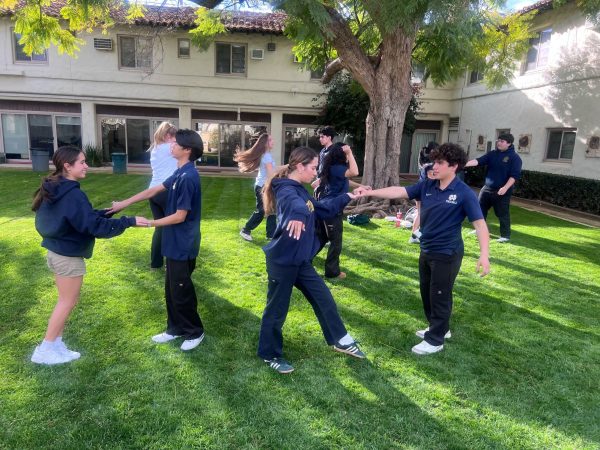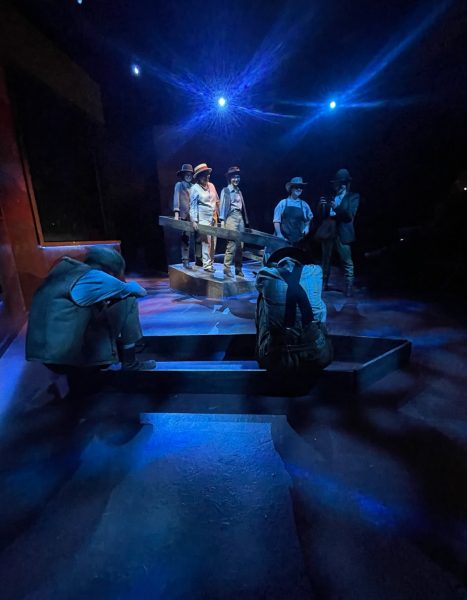Dribbling, Drills, and Drama
The beauty that emerges when soccer moves to the stage and actors become athletes
The team poses with orange slices in their mouths, right before a big game!
The fall play, The Wolves by Sarah DeLappe, directed by Mr. Wollman, opened on September 22 and ran for 3 days. The show follows a high school soccer team of 9 girls finding their way through the wild ups and downs of teenage friendships, drama, grief, and growing up.
The scenes all take place either before or after a soccer game, as the girls warm up or cool down while having dozens of strange conversations, laughs, and arguments.
In all forms of storytelling, audiences love to be able to relate to the characters. The shows put on by the Notre Dame Theater department over the years have allowed for that exact thing.
Last spring, the teachers and parents related to the hilarious adult characters in the production of School of Rock. This fall, The Wolves gave the students of ND a chance to see themselves and find comfort in the complex, flawed high-schoolers in the show who are struggling through the same problems they are. The teenage audience found humor in the relatability of the ongoing jokes and teasing between friends.
The actors in the show especially appreciated the realistic depiction of teenage girls. Summer Kastner ‘25 who plays the team captain, #25, said, “Every character in this play has a specific issue— like being too controlling, too outspoken, too quiet, too weird. I think that’s something many teens in high school can relate to and it’s pretty cool to be a part of something that really shows the emotions of those issues.”
This show is incredibly unique in a few different ways. Firstly, the characters are never referred to by actual names. Instead, they are known simply by the numbers on their jerseys.
While some might assume that this would make it confusing or hard to differentiate the girls, the writing and acting is so specific to each character, that this potential issue is entirely eliminated. The playwright intended the characters to be known as their own individual athletes, rather than other labels commonly given to women, such as girlfriend, sister, daughter, etc. Every character’s personality and individuality becomes so apparent through the dialogue and the actors’ portrayal of these different identities.
Mr. Wollman said, “The writing creates a wonderful challenge for the actors by forcing them to be so specific with their characterizations and dive deep into their characters’ motivations and how they feel about every character and every topic that’s brought up. It’s a great opportunity for the actors to live in their characters’ skin with nowhere to hide, which is a very worthwhile thing.”
The set is quite unique in its bareness. A layer of Astro turf covers the floor and a curtain of the turf continues upward to form a back wall. A metal bench in the middle of the stage completes the set, which never changes throughout the show. This simplicity imitates a real soccer field, and allows the focus to be solely on the intriguing characters’ personal journeys and relationships to one another.
Along with the many laughs, there are some extraordinarily heartbreaking moments throughout this play that left the audience in tears. There is something special about the authenticity of the show that moved both the viewers and actors.
Grace Abdayem ‘23 who plays #00, said, “Making this show has been very special for me because I got to bring a lot of the struggles that I personally deal with to this character and every rehearsal feels very cathartic. I’m so happy audiences got to connect with these characters the way the cast has.”
While this show might be more minimal in its cast size, length, and set design in comparison to past productions, its depth and truthful reflection of the teenage experience exhibits the heart of Notre Dame theater.






